Featured
 The cost of reparations. By
The cost of reparations. By
At the heart of the reparations debate are questions about what reparations for Black Americans could look like. Economist William “Sandy” Darity and folklorist Kirsten Mullen on how the United States can compensate Black Americans for slavery, Jim Crow, and ongoing discrimination.
If cash payments are one way forward, how much money would be sufficient to cover the horrors of centuries of slavery and decades of Jim Crow and racial discrimination? And how would the United States, with its inflation woes and mounting debt, pay for them?
For the second episode of the “40 Acres,” a special four-part miniseries on Vox Conversations, I talk to the husband and wife duo, economist William “Sandy” Darity and folklorist Kirsten Mullen, about the reparations framework they outline in their book From Here to Equality: Reparations for Black Americans in the Twenty-First Century.
Darity and Mullen’s reparations framework is based on three elements: acknowledgment, redress, and closure. Read more
Political / Social
 Scholar who saw all this coming: Americans “do not really understand liberal democracy.” By Chauncey Devega / Salon
Scholar who saw all this coming: Americans “do not really understand liberal democracy.” By Chauncey Devega / Salon
Shawn Rosenberg predicted the “inexorable decline” of democracy in 2019. But he still thinks it’s not too late
In this conversation with Rosenberg, he reflects on how the American and global crisis of democracy has accelerated in ways even worse than he predicted three years ago. The factors that have empowered right-wing populism in the U.S. and across the West, he says, include a deep public yearning for authoritarian and “strongman” leaders and the simple solutions they offer for complex problems. Illiberal movements are also compelling for those who are attracted to violence and destruction, especially against groups they perceive as the Other. Read more
Related: Donald Trump and His Two Forms of Fascism. David Corn / Mother Jones
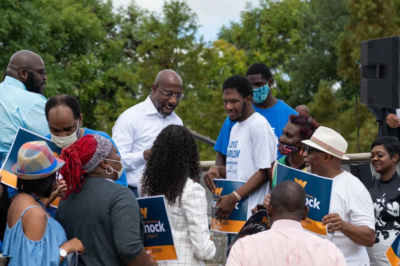 Abrams and Warnock need rural Black voters to turnout again. By Sam Gringlas / NPR
Abrams and Warnock need rural Black voters to turnout again. By Sam Gringlas / NPR
More than 50,000 people have registered in Southwest Georgia since 2018. The majority are non-white, the New Georgia Project says.
“Look, for the most part, the rural characterization is true,” says Dante Chinni, a researcher with the American Communities Project who has studied rural African American counties in the South. “Rural America tends to vote for Trump, tends to be Republican. But when you divide the vote further, you see these subtleties and nuances.” Nearly a quarter of rural Americans were people of color in 2020, according to an analysis by the Brookings Institution. And while the country’s rural population is shrinking overall, its diversity is growing. Read more
Related: What polls say about Democrats’ midterm chances. By Andrew Prokop / Vox
Related: Democrats’ Black Male Voter Problem. By Charles M. Blow / NYT
 ‘Jackson Knew This Was Coming.’ By Abe Asher / The Progressive
‘Jackson Knew This Was Coming.’ By Abe Asher / The Progressive
Mississippi’s mostly Black capital city has been at the mercy of a conservative white state government for decades. The water crisis is its latest battle for self-determination.
The lack of investment in the state’s working people extends far beyond water infrastructure. During his tenure as governor, Reeves has refused to expand Medicaid, cut income taxes, and allowed public schools to go underfunded. In April, he vetoed state funding for upgrades to a Jackson park and planetarium because, “Jackson is not one suburban golf course and one planetarium away from thriving.” Many in Jackson are simply resigned to the notion that their city and state governments are either too inept or too callous to reliably provide basic services. Read more
Related: Exceptions to American Exceptionalism. By Mark Fiore / The Progressive
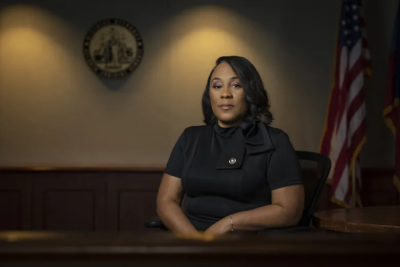 In Atlanta, a Local Prosecutor Takes on Murder, Street Gangs and a President. By Richard Fausset / NYT
In Atlanta, a Local Prosecutor Takes on Murder, Street Gangs and a President. By Richard Fausset / NYT
Fani T. Willis has emerged as one of the most consequential legal threats to Donald Trump while presiding over the justice system in Georgia’s most populous county.
Ms. Willis, 50, a Democrat, is the first Black woman to lead Georgia’s largest district attorney’s office. In her 19 years as a prosecutor, she has led more than 100 jury trials and handled hundreds of murder cases. Since she became chief prosecutor, her office’s conviction rate has stood at close to 90 percent, according to a spokesperson. Her experience is the source of her confidence, which appears unshaken by the scrutiny — and criticism — the Trump case has brought. Read more
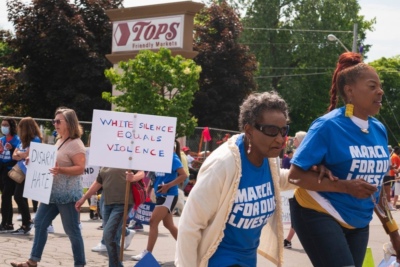 White Violence and Black Buffalo. By Victoria W. Wolcott / AAIHS
White Violence and Black Buffalo. By Victoria W. Wolcott / AAIHS
Women at the ‘March for our Lives’ event following Topps mass shooting, July 11, 2022, Buffalo, New York (Shutterstock)
The overt violence of the white supremacist gunman who brutally murdered ten Black Buffalonians in May has exposed a more hidden violence that has impacted African American East Siders for generations. The massacre was as horrific a form of white supremacist violence as one could imagine. African American citizens were gunned down by a racist targeting the only full-service grocery store in Buffalo’s East side. The visibility of this horrific act, however, underscores a long legacy of hidden violence against Black Buffalonians. This legacy of white violence is rarely acknowledged but has long-term and deeply pernicious influences. And it undermines Buffalo’s status as a city that values “good neighbors.” Read more
Related: The Long History of Residential Segregation in Buffalo. By Henry Louis Taylor Jr / AAIHS
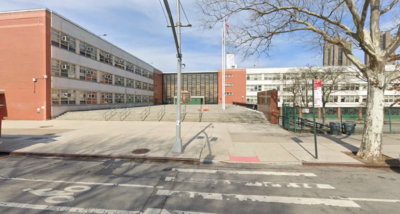 Court throws out claim that selective NYC high schools discriminate against Asian American students in admissions. By
Court throws out claim that selective NYC high schools discriminate against Asian American students in admissions. By
A 2018 diversity initiative could not have been discriminatory, the judge said, because more students of Asian descent were admitted under it. Shown is The Bronx High School of Science in New York.
Judge Edgardo Ramos on Wednesday denied the request from two Asian civil rights groups, a parent-teacher organization and Asian American parents to halt a diversity initiative that has since been instituted in New York City’s most selective high schools. The policy could not have been discriminatory, Ramos said, because on the whole, more students of Asian descent had been offered admission under the measure, not fewer. Read more
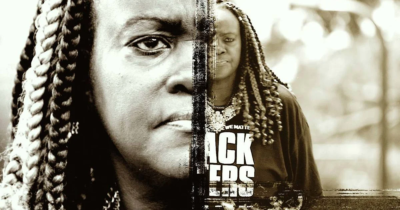 Meet the Woman Fighting for the Rights of Voters Who Can’t Read. By Mauricio Rodríguez Pons, Aliyya Swaby and Annie Waldman / Propublica
Meet the Woman Fighting for the Rights of Voters Who Can’t Read. By Mauricio Rodríguez Pons, Aliyya Swaby and Annie Waldman / Propublica
Olivia Coley-Pearson offered help to voters who struggle to read. For taking on one of America’s oldest forms of voter suppression, she got threats, a trip to jail and a reminder of the nation’s long legacy of weaponizing literacy.
Before 1965, many Southern states forced voters to prove they could read before casting a ballot, a requirement primarily designed to keep Black people from voting. The Voting Rights Act put an end to those polling site exams. But a ProPublica investigation found that the efforts to block people who have difficulty reading from casting a ballot continue, especially in the South. In fact, today’s election system remains a modern-day literacy test. Read more
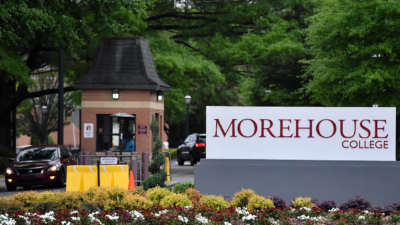 Applications to HBCUs rise dramatically as nationwide college enrollment falls. By Hari Sreenivasan and Sarah Clune Hartman / PBS
Applications to HBCUs rise dramatically as nationwide college enrollment falls. By Hari Sreenivasan and Sarah Clune Hartman / PBS
The number of undergraduate students has dropped by almost 10% during the pandemic. But it’s been a different story for some time at many historically Black colleges and universities. Applications are up nearly 30% at many of these schools and top-tier HBCUs are increasingly becoming the first choice for some of the most sought-after students. Special correspondent Hari Sreenivasan reports. Read more
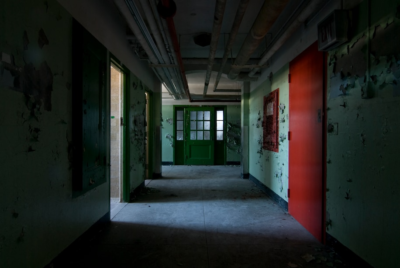 NIH lecture to delve into racism of mental health care in the South. By Erin Blakemore / Wash post
NIH lecture to delve into racism of mental health care in the South. By Erin Blakemore / Wash post
Filthy wards. Unlicensed doctors. Forced labor. Outdated treatments, or no treatment at all. For nearly a century after the Civil War, Black patients in segregated state psychiatric facilities in the South endured unthinkable conditions for no reason other than the color of their skin. On Sept. 15 at 2 p.m. Eastern, a free virtual lecture will delve into the grim realities of those separate and unequal facilities — and explore their long-lasting effects in modern mental health care. Read more
Ethics / Morality / Religion
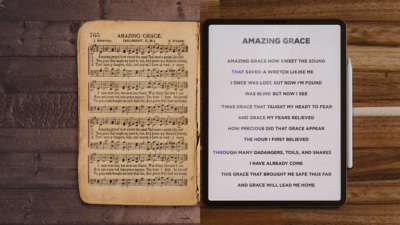 We’ve Sung ‘Amazing Grace’ for 250 Years. We’ve Only Just Begun. By Daniel Johnson / Christianity Today
We’ve Sung ‘Amazing Grace’ for 250 Years. We’ve Only Just Begun. By Daniel Johnson / Christianity Today
Why John Newton’s famous hymn is still so powerful after so long.
The hymn has known so many lives. “Amazing Grace”—250 years old this year—has been sung in churches and at funerals. It is a civil rights anthem, a civil religion anthem, a folk song, and a pop culture icon. It has been featured on The Simpsons, Cheers, and Star Trek, and it gave expression to America’s grief in the days and weeks after 9/11. It’s been covered by devoutly Christian artists, such as Johnny Cash and Aretha Franklin, but also by Willie Nelson, Ani DiFranco, and the Dropkick Murphys. Read more
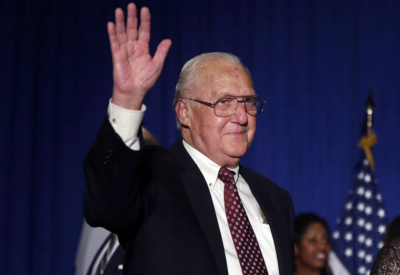 Moon Landrieu was a visionary Catholic mayor who reshaped New Orleans. By Jason Berry / NCR
Moon Landrieu was a visionary Catholic mayor who reshaped New Orleans. By Jason Berry / NCR
Former New Orleans Mayor Moon Landrieu waves at an event before the incumbent mayor, his son Mitch, arrives to address supporters after winning reelection in New Orleans Feb. 1, 2014. (AP/Gerald Herbert, file)
Landrieu’s achievement in eight years as mayor, balancing racial progress and economic growth, set the stage for a line of African American mayors, interrupted in 2010 when Landrieu’s son, Lt. Governor Mitch Landrieu, won the mayoralty with New Orleans plagued by blight and broken streets five years after Hurricane Katrina. The second Mayor Landrieu accessed federal funds for a vast rebuilding program of the city his father had ushered into the modern world. Moon’s commitment to racial equity sparked scorn among some whites, yet when his heart stopped on Labor Day, Sept. 5, at age 92, surrounded by his wife, Verna, and the large family, praise poured out from many corners. Read more
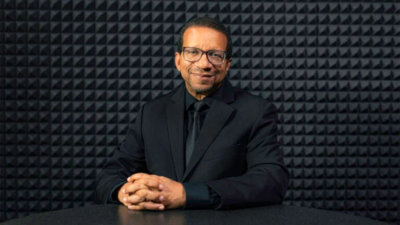 Fuller Theological Seminary names first Black president. By Yonat Shimron / Religion News Service
Fuller Theological Seminary names first Black president. By Yonat Shimron / Religion News Service
David Emmanuel Goatley, an associate dean at Duke Divinity School, will replace Mark Labberton, who announced he was stepping down from the Pasadena, California, seminary last year.
A native of Louisville, Kentucky, Goatley, 61, is ordained in the National Baptist Convention. He earned a Ph.D. at Southern Baptist Theological Seminary and is best known for his theological study of mission work. For more than two decades, he served as CEO of Lott Carey Baptist Foreign Mission Society, a Black missions agency, stepping down in 2018. Read more
 The Catholic Church is increasingly diverse – and so are its controversies. By Mathew Schmatz / The Conversation
The Catholic Church is increasingly diverse – and so are its controversies. By Mathew Schmatz / The Conversation
In 1910, two-thirds of the world’s Catholics lived in Europe. Today, just one in four do. The church’s numbers have grown most quickly in Africa and Asia. As more power shifts to the global south, the church sometimes struggles to chart a path forward for all regions, each of which has its own distinct perspectives. The most public disagreement involves African Catholics and those in the United States and Europe. For example, Ghanaian Catholic bishops have criticized advocates for LGBTQ rights for imposing “their so-called values and beliefs.” Other African bishops have said they feel betrayed by liberal sentiments in European Catholicism, such as the push to allow Holy Communion for divorced church members. Read more
 Small Evangelical College Stands Out for Diversity. By David Roach / Christianity Today
Small Evangelical College Stands Out for Diversity. By David Roach / Christianity Today
Houston’s College of Biblical Studies, where three-quarters of students are Black or Hispanic, finds ministry partners in DTS and Tony Evans.
CBS was founded in 1976 as Houston Bible and Vocational Institute. Initially, classes were held at KHBC, a Christian radio station in Houston. Quickly, the school turned its focus to biblical and theological training, which led to its current name. CBS moved to its present two-acre campus in 1994. Indianapolis and Fort Wayne campuses were added in 2019 when CBS merged with Indiana’s Crossroads Bible College. The balance between evangelical theology and ethnic diversity may seem like it shouldn’t work. But it does. Blocker calls the college’s unique relational chemistry “grace relations.” Read more
Historical / Cultural
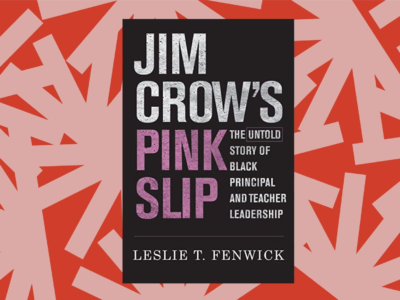 ‘Jim Crow’s Pink Slip’: How 1954 Brown decision affects teachers today. By Chelsea Sheasley / CSM
‘Jim Crow’s Pink Slip’: How 1954 Brown decision affects teachers today. By Chelsea Sheasley / CSM
Dr. Fenwick’s most recent book, “Jim Crow’s Pink Slip: The Untold Story of Black Principal and Teacher Leadership,” published earlier this year, tells the story of highly qualified Black educators displaced during school integration efforts. The book presents historical evidence showing that following the landmark 1954 U.S. Supreme Court case, Brown v. Board of Education, which ended segregation in schools, nearly 100,000 Black educators were dismissed or demoted from their positions and often replaced with less qualified white educators. Read more
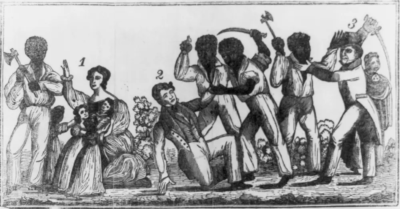 Conference on slave rebellions offers in-depth way to teach history some don’t want in schools. By Curtis Bunn / NBC News
Conference on slave rebellions offers in-depth way to teach history some don’t want in schools. By Curtis Bunn / NBC News
An illustration depicting Nat Turner’s Rebellion in Southampton County, Va., on Aug. 21, 1831.
As the campaign to quash the teachings of America’s brutal history of slavery intensifies, Joseph McGill Jr. has waged a counterattack by way of a poignant three-day conference in this antebellum port town that was once responsible for the most sales and transports of enslaved Africans to major cities in the U.S. A contained glee emanated from McGill, a historian and the founder of the Slave Dwelling Project, which kicked off its seventh annual conference last week with a focus on the 1739 Stono Rebellion, an uprising of enslaved people who killed plantation owners and their families in South Carolina to free themselves. Read more
 Navy should rename warship that honors Confederate victory, commission recommends. By Lara Seligman / Politico
Navy should rename warship that honors Confederate victory, commission recommends. By Lara Seligman / Politico
An independent commission is recommending the Navy scrap the name of a guided-missile cruiser that honors a Confederate battlefield victory, part of a broader effort to scrub the names of Confederate leaders from Defense Department property. In the final installment of a three-part report, the commission that was established to rename bases that honor Confederate leaders announced on Tuesday its recommendation that the Navy rename the USS Chancellorsville, a Ticonderoga-class guided-missile cruiser, and the USNS Maury, an oceanographic survey ship. Read more
Related: Panel says Confederate memorial at Arlington cemetery should be dismantled. By AP and The Guardian
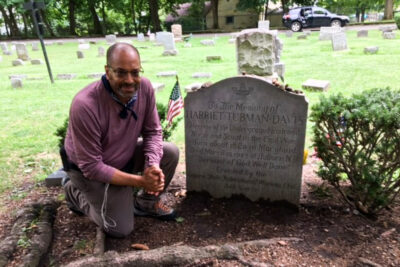 Philadelphia man completes over 400-mile walk along the Underground Railroad in honor of Harriet Tubman. By Claretta Bellamy / NBC News
Philadelphia man completes over 400-mile walk along the Underground Railroad in honor of Harriet Tubman. By Claretta Bellamy / NBC News
Kenneth Johnston of West Philadelphia always had a deep appreciation for Harriet Tubman and her work of freeing enslaved Black people. But instead of reading a book or watching a documentary to remember Tubman’s trek to freedom, Johnston put his shoes on and followed the same path she walked in her honor. On Saturday, Johnston, 61, completed his over 400-mile trek, which he called a Walk to Freedom. His journey led him across New York state and along the routes of the Underground Railroad, stopping by historic Black sites and communities along the path. Read more
 The Reactionary Geeks Are Mad About ‘Rings of Power.’ By Adam Serwer / The Atlantic
The Reactionary Geeks Are Mad About ‘Rings of Power.’ By Adam Serwer / The Atlantic
The demand to keep politics out of art is too often a demand for art to conform to conservative politics.
Maybe you’ve heard that people are mad about Black actors being cast in Lord of the Rings. Or Game of Thrones. Or maybe it was Star Wars. Or perhaps Thor. Wait, maybe it was Titans, or Superman. The Witcher? Or maybe you heard that people are angry that Black Panther got made in the first place, because Wakanda is fictional, unlike one of those fantasy countries authors seem to think will seem more mysterious if you add enough accents or apostrophes, like Warthéréth’rién. (I just made that up.) Maybe you’re wondering why adults care about a Disney mermaid being Black. Read more
Related: Racists Are Worried About the Historical Accuracy of Mermaids. By EJ Dickson / Rolling Stone
 Black women winning at the 2022 Emmys is more than just a monumental moment in Hollywood. By Char Adams / NBC News
Black women winning at the 2022 Emmys is more than just a monumental moment in Hollywood. By Char Adams / NBC News
US writer Quinta Brunson accepts the award for Outstanding Writing For A Comedy Series for “Abbott Elementary” during the 74th Emmy Awards at the Microsoft Theater in Los Angeles, on Sept. 12, 2022.
Sheryl Lee Ralph, Quinta Brunson, Lizzo and Zendaya dominated the 2022 Emmys, making the biggest night in television a historic moment for Black women in TV. Ralph, a Hollywood legend with a career spanning more than 40 years, took home her first Emmy on Monday. At 32, Brunson made history by being the youngest Black woman nominated for an award in the comedy acting category. She’s also the second Black woman in the Emmys’ 74-year history to win the award for outstanding writing for a comedy series. Read more
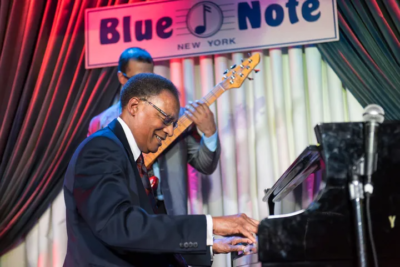 Renowned Jazz Pianist Ramsey Lewis Dead At 87. By AP and HuffPost
Renowned Jazz Pianist Ramsey Lewis Dead At 87. By AP and HuffPost
Lewis is revered in jazz circles for 1960s hits like “The In Crowd,” “Hang on Sloopy” and “Wade in the Water.”
Ramsey Lewis described his approach to composing and performing in a 2011 interview with the AP. “Life is a solo, and it continues,” Lewis said, sitting at the dining room table in his downtown Chicago home. “I just know that when I put my hands on the piano it’s going to flow.” Lewis first took piano lessons at age 4. He spent his early days in Chicago using his gospel and classical roots to create his own jazz style in the many neighborhood venues that hired young jazz musicians. Read more
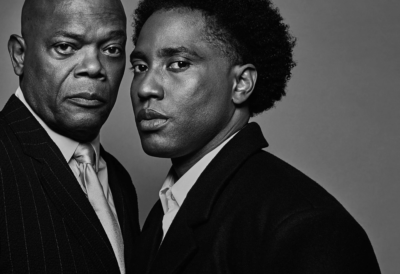 Samuel L. Jackson and John David Washington Bring ‘The Piano Lesson’ Back to Broadway. By Tony Norman / Vanity Fair
Samuel L. Jackson and John David Washington Bring ‘The Piano Lesson’ Back to Broadway. By Tony Norman / Vanity Fair
This fall, the pair hit Broadway in a revival of August Wilson’s The Piano Lesson, directed by LaTanya Richardson Jackson. An exclusive interview with kindred spirits.
Washington has known Jackson since the former was a toddler, thanks to Jackson’s friendship with his father, Denzel. Still, it sounds like it’d be intimidating to re-create the role right in front of him. Jackson waves the idea away. “He didn’t see me do it,” he says, then adds playfully, “but I killed that shit.” Washington laughs: “And the ghosts, like in the theme of the play, will forever haunt us.” Read more
Sports
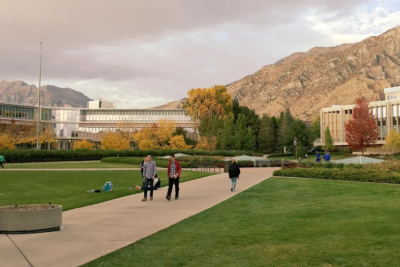 Rachel Richardson Duke volleyball: Why BYU reacted the way it did to this story. By Max Perry Mueller / Slate
Rachel Richardson Duke volleyball: Why BYU reacted the way it did to this story. By Max Perry Mueller / Slate
A visiting volleyball player heard a racist heckler. LDS history sets this story apart.
If you haven’t followed Rachel Richardson’s story, which in the past week has become the most highly debated topic in college sports, here is a brief rundown. Last Friday night, at Brigham Young University’s Smith Fieldhouse, Duke and BYU women’s volleyball teams squared off as part of a multiteam tournament. During the match, Richardson said, at least one BYU fan in the students’ section yelled the N-word at her. Two distinct reactions to last week’s incident are both rooted in Mormonism. That’s because Mormonism is a religion that embodies two truths at once: It promotes a racially particularistic doctrine that has, at times, favored certain racial groups over others. And it promotes a universalistic doctrine that also has sought to embrace everyone, everywhere. Read more
 Why Tiafoe is probably not a symbol of things to come in tennis. By Harry Edwards / CNN
Why Tiafoe is probably not a symbol of things to come in tennis. By Harry Edwards / CNN
Harry Edwards, a sociologist and professor emeritus at the University of California, Berkeley, is the author of “The Revolt of the Black Athlete,” about Black activism on the playing field and in the athletic arena.
If you watched Frances Tiafoe play at the US Open last week in hopes of seeing the next chapter in the evolution of a gifted tennis talent, then you were richly rewarded. But if you were looking for evidence of efforts by officials in the sport to ensure that there are more Tiafoes who follow in his footsteps, you may have to keep waiting. Read more
Related: The future of tennis (finally) appears. By Michele L. Norris / Wash Post
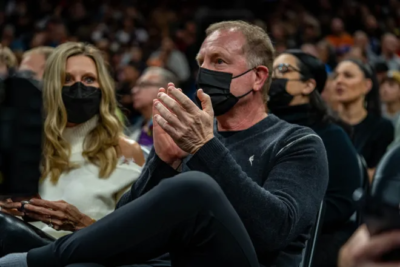 Phoenix Suns team owner Robert Sarver suspended for 1 year, fined $10M after NBA investigation. By Duane Rankin / AZ Central
Phoenix Suns team owner Robert Sarver suspended for 1 year, fined $10M after NBA investigation. By Duane Rankin / AZ Central
The NBA statement said the firm’s investigation concluded that Sarver “engaged in conduct that clearly violated common workplace standards, as reflected in team and league rules and policies. This conduct included the use of racially insensitive language; unequal treatment of female employees; sex-related statements and conduct; and harsh treatment of employees that on occasion constituted bullying.” Read more
 Stephen Curry Is Putting It All on the Line. By Matt Sullivan / Rollling Stone
Stephen Curry Is Putting It All on the Line. By Matt Sullivan / Rollling Stone
At 34, Curry is “absolutely” committed to winning the title again this year. But the game isn’t his only focus. Curry has raised his profile as a businessman, a humanitarian, and — slowly but surely — an activist and more vocal political leader.
Curry has already put his brand on the line by clashing with Trump, endorsing Joe Biden, and marching for racial justice. Now, Curry is grappling with how he might expand the meaning of influence, and wondering what the fuck he is gonna say next. “You’re growing and evolving on the same page as these national, politicized conversations, but it doesn’t have to be sides,” he tells me, pinching at his scraggly under-chin stubble. “What I try to do is be real, but also activate conversation that is sometimes uncomfortable.” Read more
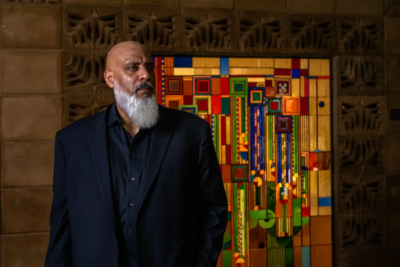 The Man Who Keeps Baseball’s Union Moving. By Scott Miller / NYT
The Man Who Keeps Baseball’s Union Moving. By Scott Miller / NYT
With Tony Clark running the show, M.L.B.’s players have labor peace, are on the path to unionizing minor leaguers for the first time and say they are fighting for the soul of the game.
Clark was named the union’s director of player relations in 2010, the year after his retirement. Michael Weiner led the union then, and his goal had been to build out a formal player relations department that would engage and educate the next generation of players. Clark was to work as Weiner’s wingman in that capacity and then ride off into the sunset. Three years later, Weiner was dead from a brain tumor. Clark, upon Weiner’s recommendation in those final months, succeeded him. Read more
Site Information
Articles appearing in the Digest are archived on our home page. And at the top of this page register your email to receive notification of new editions of Race Inquiry Digest.
Click here for earlier Digests. The site is searchable by name or topic. See “search” at the top of this page.
About Race Inquiry and Race Inquiry Digest. The Digest is published on Mondays and Thursdays.
Use the customized buttons below to share the Digest in an email, or post to your Facebook, Linkedin or Twitter accounts.